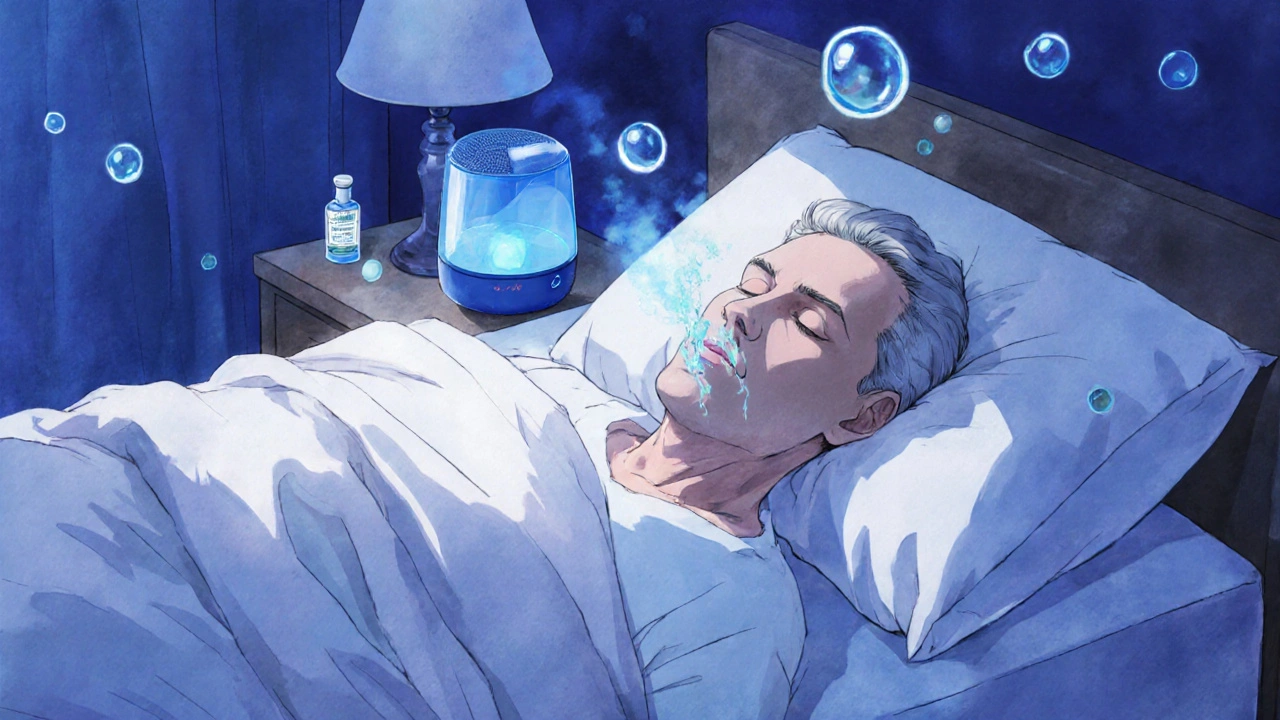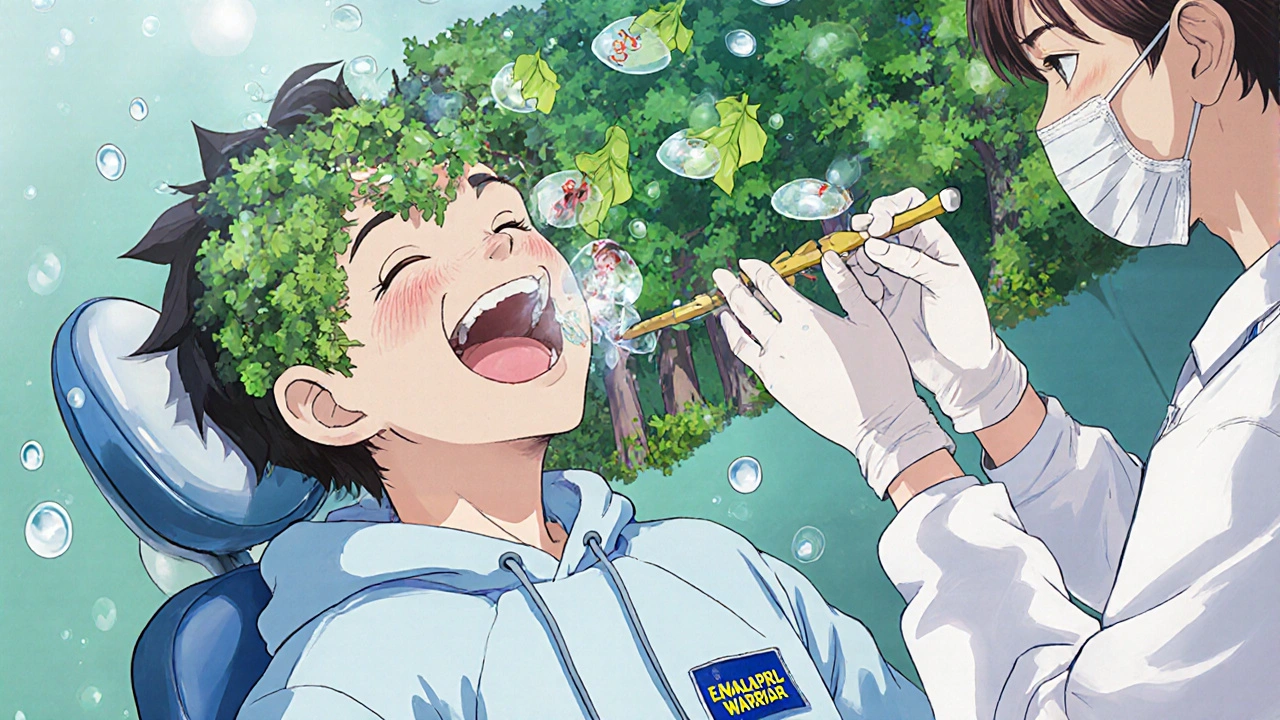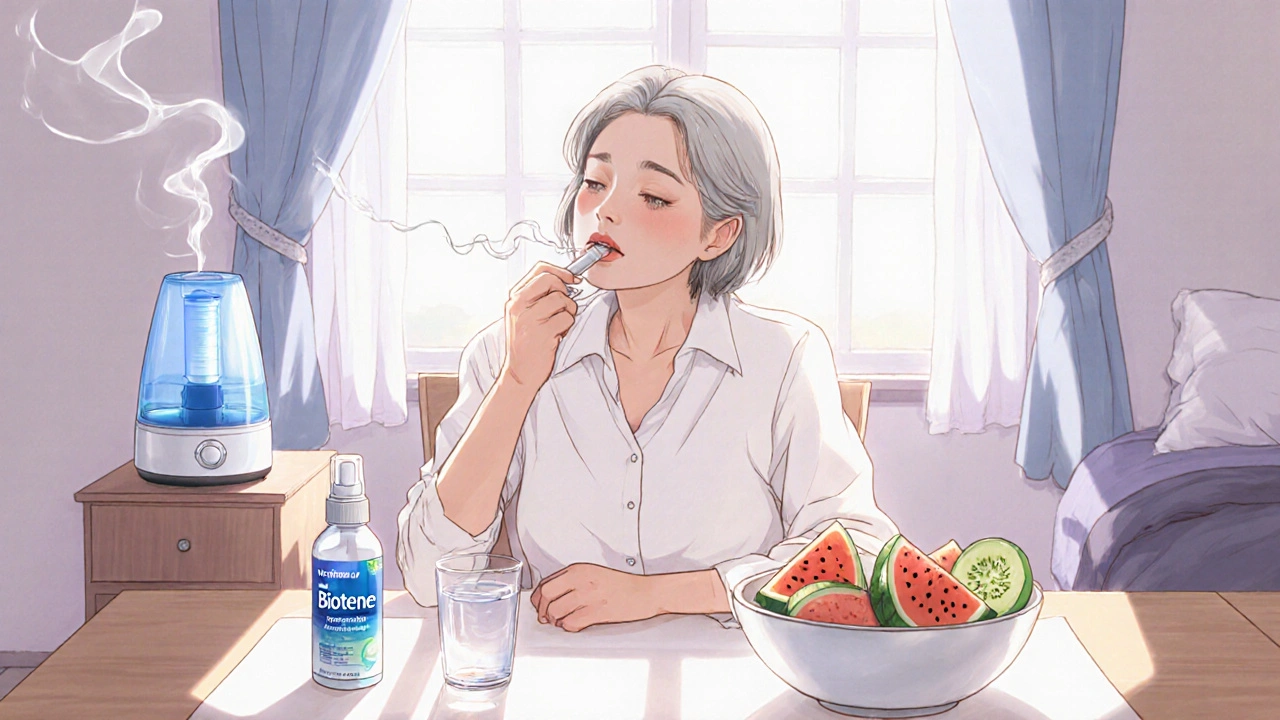If you're taking enalapril for high blood pressure and suddenly feel like your mouth is full of cotton, you're not alone. Dry mouth is one of the most common complaints people have when starting this medication. It’s not dangerous, but it’s annoying-making it hard to swallow, speak, or even enjoy a meal. The good news? There are real, simple ways to manage it without stopping your medicine.
Why Enalapril Causes Dry Mouth
Enalapril is an ACE inhibitor, a type of blood pressure drug that works by relaxing blood vessels. One side effect of this mechanism is reduced saliva production. Saliva isn’t just for tasting food-it keeps your mouth moist, helps digest food, and protects your teeth from decay. When enalapril affects your body’s fluid balance and blood flow to salivary glands, those glands don’t get the signal to produce enough saliva.
This isn’t random. A 2023 study in the Journal of Clinical Hypertension found that nearly 22% of patients on ACE inhibitors reported persistent dry mouth after three months. The effect tends to show up within the first few weeks and can stick around if not addressed. It’s not a sign the drug isn’t working-it’s just how your body reacts.
Hydration Isn’t Enough-Here’s What Actually Works
Drinking more water sounds like the obvious fix, and it helps-but alone, it won’t solve the problem. Your body isn’t lacking water; it’s lacking saliva. You need to stimulate your salivary glands, not just add more liquid.
- Chew sugar-free gum-especially with xylitol. It’s been shown in clinical trials to increase saliva flow by up to 40% in people on ACE inhibitors. Look for brands like Spry or Trident Sugar-Free.
- Suck on sugar-free hard candies-again, xylitol-based. Avoid anything with sugar; it feeds cavity-causing bacteria that thrive in dry mouths.
- Use a saliva substitute-products like Biotene Oral Balance or Xerostom are available over the counter. They mimic natural saliva and can be sprayed or rinsed in the mouth. Apply before meals and bedtime.
- Use a humidifier at night-if you breathe through your mouth while sleeping, your mouth dries out even more. A cool-mist humidifier in your bedroom adds moisture to the air and helps your mouth stay damp overnight.
Watch What You Eat and Drink
Some foods and drinks make dry mouth worse. Avoid:
- Caffeine (coffee, tea, energy drinks)-it’s a diuretic and dries you out further.
- Alcohol-same issue. It also irritates the lining of your mouth.
- Salty or spicy foods-these can feel harsh when your mouth is already dry.
- Dried fruits and crackers-they stick to your mouth and make swallowing painful.
Instead, go for:
- Water-rich foods: cucumbers, watermelon, celery, oranges, and strawberries.
- Soft, moist meals: soups, stews, oatmeal, scrambled eggs, and mashed potatoes.
- Herbal teas like chamomile or peppermint-just skip the caffeine and don’t add honey if you’re watching sugar.

Dental Care Becomes Critical
Saliva is your mouth’s natural defense. Less saliva means more plaque, more cavities, and a higher chance of gum disease. People on enalapril are twice as likely to develop tooth decay if they don’t adjust their oral care routine.
Here’s what to do:
- Brush twice a day with fluoride toothpaste-don’t skip nighttime brushing.
- Floss daily-food gets trapped more easily in dry mouths.
- Use a mouthwash without alcohol. Look for ones labeled ‘for dry mouth’ or ‘SLS-free’ (sodium lauryl sulfate can irritate).
- See your dentist every six months. Tell them you’re on enalapril. They can apply fluoride varnish or prescribe a stronger toothpaste if needed.
When to Talk to Your Doctor
Most of the time, dry mouth from enalapril is manageable with lifestyle changes. But if you’re experiencing:
- Severe pain or sores in your mouth
- Difficulty swallowing or speaking
- Loss of taste that lasts more than a few weeks
- Signs of infection-white patches, bad breath that won’t go away
Then it’s time to call your doctor. They might adjust your dose, switch you to a different blood pressure medication like losartan (an ARB), or prescribe a drug like pilocarpine that stimulates saliva production.
Don’t stop enalapril on your own. High blood pressure is a silent threat. If your dry mouth is bad enough to make you consider quitting your meds, talk to your doctor first. There are other options that don’t cause dry mouth as often.
Real-Life Fix: What Works for People
One patient in her 60s from Nova Scotia started taking enalapril and couldn’t eat dry toast without drinking water. She tried everything. Then she started chewing xylitol gum before every meal and kept a small bottle of Biotene spray on her nightstand. Within two weeks, she could eat her usual breakfast without discomfort.
Another man in his 50s noticed his lips cracked badly. He switched to a lip balm with hyaluronic acid and started using a humidifier. He also cut out his afternoon coffee. His dry mouth improved in under 10 days.
These aren’t miracles-they’re small, consistent changes that add up.

Can You Switch Medications?
Yes, but not without a plan. Not all blood pressure meds cause dry mouth. ARBs like losartan or valsartan are just as effective as enalapril but have lower rates of dry mouth-around 5% compared to 22%.
Still, switching isn’t automatic. Your doctor will consider your kidney function, blood pressure control, and whether you have heart failure or diabetes. Enalapril is often preferred for people with diabetic kidney disease. If you’re doing well on it, they might stick with it and just help you manage the side effect.
There’s no one-size-fits-all. But you have options. And you don’t have to live with a dry mouth if it’s affecting your quality of life.
Quick Summary
- Dry mouth from enalapril is common and not dangerous-but it needs attention.
- Chewing xylitol gum and using saliva substitutes are more effective than just drinking water.
- Avoid caffeine, alcohol, and salty foods-they make it worse.
- Dental care is non-negotiable. Fluoride toothpaste, alcohol-free mouthwash, and regular cleanings are essential.
- If symptoms are severe, talk to your doctor about switching to an ARB like losartan.
Can enalapril cause permanent dry mouth?
No, enalapril does not cause permanent dry mouth. Once you stop taking it or switch to another medication, saliva production typically returns to normal within a few days to weeks. The dryness is a reversible side effect tied to how the drug affects your body’s fluid regulation-not a long-term damage to your salivary glands.
Is dry mouth from enalapril worse at night?
Yes, many people notice it’s worse at night, especially if they sleep with their mouth open. Breathing through your mouth dries out your oral tissues faster. Using a humidifier, sipping water before bed, and applying a moisturizing oral gel can help. Avoid alcohol-based mouthwashes before bed-they evaporate quickly and leave your mouth feeling drier.
Can I use lip balm with enalapril-induced dry mouth?
Yes, and you should. Dry lips are a common companion to dry mouth. Use a plain, fragrance-free lip balm with ingredients like shea butter, ceramides, or hyaluronic acid. Avoid products with menthol, camphor, or phenol-they can irritate and dry your lips further. Reapply often, especially before going outside in cold or windy weather.
Does drinking more water help with dry mouth from enalapril?
Drinking water helps a little, but it doesn’t fix the root cause. Your body isn’t dehydrated-it’s not producing enough saliva. Water keeps you hydrated overall, but to relieve dry mouth, you need to stimulate saliva flow. That’s why chewing gum, using saliva sprays, or sucking on sugar-free candies works better than just sipping water all day.
Are there natural remedies for dry mouth from enalapril?
Some natural options can help. Aloe vera juice rinses (swish and spit) may soothe dry tissues. Green tea (decaffeinated) has antioxidants that support oral health. Some people find relief with ginger or licorice root teas, but evidence is limited. Always check with your doctor before trying herbal remedies-they can interact with blood pressure meds.
Next Steps
Start with one or two of the easiest fixes: buy a pack of xylitol gum and a small bottle of alcohol-free mouthwash. Use them consistently for a week. If you don’t feel better, add a humidifier and switch your snacks to moist, water-rich foods.
If after two weeks you’re still struggling, schedule a chat with your doctor. Bring a list of what you’ve tried. They can help you decide if it’s time to switch medications or if you need extra support like a saliva-stimulating prescription.
Managing side effects is part of taking any long-term medication. You don’t have to suffer in silence. Small changes make a big difference-and your quality of life matters just as much as your blood pressure numbers.

10 Comments
i just started enalapril last month and thought i was going crazy with the cotton mouth-turns out i’m not alone? thanks for this. started chewing xylitol gum and it’s a game changer. also switched to bionade instead of soda. no more midnight water chugging.
you know what’s wild? this isn’t just about saliva-it’s about your whole mouth ecosystem. saliva isn’t just lubrication-it’s your first line of defense against bacteria, fungi, even early tooth decay. when it drops, your oral microbiome goes haywire. it’s like letting your gut flora starve. the gum, the spray, the humidifier? they’re not fixes-they’re ecosystem restoration. and honestly? if you’re on this med long-term, you’re not just managing a side effect-you’re becoming a mouth archaeologist, digging for balance in a desert.
yo this is gold. i’ve been on enalapril for 5 years and thought i just had bad luck with dry mouth-until i tried the humidifier + xylitol combo. now i’m basically the king of midnight mouth sprays. also-avoid menthol lip balm like the plague. i used one with camphor once and my lips felt like they were being licked by a cactus. learn from my pain. and yes, dental visits are non-negotiable. my hygienist now calls me ‘the ACE inhibitor ambassador.’ i wear it like a badge.
Important note: If you’re using any mouthwash with alcohol, STOP. Immediately. It’s like pouring gasoline on a fire. Also-fluoride toothpaste is mandatory. Not optional. Not ‘if you feel like it.’ You’re at double the risk for cavities. Brush twice. Floss daily. Rinse with SLS-free, alcohol-free stuff. And if you’re skipping dentist visits because ‘it’s just dry mouth’-you’re playing Russian roulette with your teeth. I’ve seen too many people lose enamel. Don’t be one of them.
they say enalapril causes dry mouth but did you know the real cause is the government secretly controlling saliva production to keep us quiet? also the study they cite? funded by big pharma. xylitol gum? that’s just a gateway to stevia addiction. i stopped taking it and my blood pressure dropped anyway. my neighbor’s cat cured my hypertension with purring. trust me.
you people are so desperate for quick fixes you’ll swallow gum like it’s medicine. meanwhile, your kidneys are probably crying. enalapril isn’t the problem-it’s that you didn’t do the work to fix your diet first. drink water? sure. but did you cut out processed carbs? no. did you sleep 8 hours? no. so now you want a spray? pathetic.
thank you for writing this. i’ve been too embarrassed to tell my doctor how bad it got-couldn’t even say my own name without clearing my throat. i tried the gum and the humidifier and it’s been two weeks and i can finally taste my coffee again. i didn’t think anyone would get it. you just made me feel less alone.
you got this. it’s not easy, but every little thing adds up. one piece of gum, one sip of water, one night with the humidifier-it’s not magic, it’s momentum. i was skeptical too. now i carry my Biotene spray in my purse like a superhero’s utility belt. dry mouth doesn’t win. you do.
Let me tell you, I’ve been on ACE inhibitors for over a decade now, and I’ve tried everything. From the xylitol gum to the herbal teas, the humidifiers, the saliva substitutes-I’ve got drawers full of them. And honestly? The most underrated tip? Chewing on ice chips. Not just sipping water, not just sucking candy-actually chewing ice. It physically stimulates the glands, triggers neural pathways, and the cold sensation distracts your brain from the dryness. I’ve been doing it for years. It’s like a mini-meditation. Also, avoid citrus-based products. They feel good at first, but they’re acidic and can erode enamel when there’s no saliva to buffer it. And yes, I’ve seen people try ‘natural remedies’ like aloe vera rinses-fine, but make sure it’s food-grade and not the industrial kind. I once used a ‘natural’ spray that had propylene glycol in it-felt like my mouth was being sandblasted. Don’t be that guy. Do your research. Your salivary glands will thank you.
Of course, the real issue here is not the drug-it’s the cultural obsession with symptom management over root-cause resolution. You’re all treating the mouth, not the mind. The dryness is a metaphor. You’re dehydrated spiritually. You’ve forgotten how to be still. The gum? The spray? The humidifier? They’re all distractions from the fact that you’ve outsourced your health to a pill and a blog post. You think you’re fixing your saliva-you’re just avoiding the silence. And silence, my friends, is where healing begins.
Write a comment